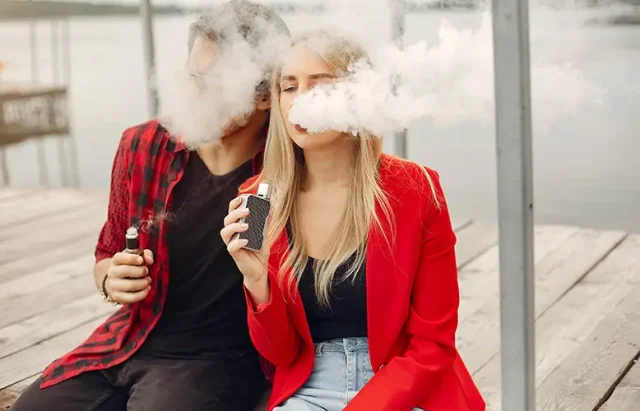
High-puff pod kits are not legal for sale in the UK if they exceed the limits set by the Tobacco and Related Products Regulations (TRPR). Devices offering over 600 puffs typically exceed the 2ml maximum e-liquid capacity mandated by UK law. As of 2025, any prefilled vape device that surpasses 2ml or contains more than 20mg/ml nicotine is classified as non-compliant. Retailing such products is illegal under UK legislation. The Medicines and Healthcare products Regulatory Agency (MHRA) monitors legal vape devices and requires manufacturers to register them before market distribution.
What Are High-Puff Pod Kits and How Do They Differ From Regular Vapes?
High-puff pod kits are rechargeable or prefilled pod vape devices offering puff counts that range between 2,000 to 30,000 puffs such as the Hyola Ultra Vape kit.
These kits typically include larger battery capacities (e.g. 1000mAh+), high e-liquid volumes (often over 10ml), and coil systems optimized for prolonged use. Unlike TRPR-compliant vapes, which are restricted to 2ml tank sizes and approximately 600 puffs, high-puff kits significantly exceed legal limits. Most high-puff devices also use mesh coil technologies and adjustable airflow systems, making them capable of delivering Direct-to-Lung (DTL), Restricted DTL (RDTL), and Mouth-to-Lung (MTL) vaping experiences.
What Does UK Vape Law Say About Puff Limits and Pod Capacity?
UK vape regulations, enforced under the Tobacco and Related Products Regulations (TRPR) aligned with the EU Tobacco Products Directive (TPD), prohibit prefilled tanks above 2ml and nicotine strength above 20mg/ml. While puff count itself is not a regulatory metric, devices claiming 3000+ puffs often contain more than 10ml of e-liquid, breaching volume restrictions.
According to the MHRA, all legally sold vape kits must be submitted to their notification portal, undergo toxicological assessments, and comply with packaging and labelling requirements. Any device not appearing on the MHRA register is illegal to sell in the UK.
Are High-Puff Vape Kits Legal to Sell or Import in the UK?
High-puff vape kits are illegal to sell or import in the UK if they violate TRPR limits. Devices exceeding the 2ml e-liquid or 20mg/ml nicotine threshold are considered non-compliant. Selling such devices can lead to enforcement actions by Trading Standards, including fines, product seizures, and criminal charges. A 2024 Trading Standards report noted a 211% increase in illegal vape seizures in London boroughs alone. Retailers attempting to import high-puff products from non-compliant suppliers outside the UK or EU often face customs rejections or legal scrutiny. While personal use of such devices is not criminalised, commercial distribution is prohibited.
Why Are High-Puff Devices Being Targeted by UK Lawmakers?
UK lawmakers are targeting high-puff devices due to rising youth vaping rates, environmental waste concerns, and regulatory loopholes exploited by importers. According to a 2023 ASH survey, 20.5% of UK teens aged 11 to 17 had experimented with vaping, a rise from 13.9% in 2021.
High-puff disposables, often brightly coloured and fruit-flavoured, have been accused of deliberately appealing to underage users. Furthermore, these devices generate significant electronic waste due to large batteries and non-recyclable parts. The UK Parliament’s Health and Social Care Committee has urged stronger enforcement and potential bans on non-rechargeable high-puff kits.
Are There Legal Alternatives to High-Puff Pod Kits in the UK?
Yes, several legal alternatives exist for vapers seeking extended use without violating UK law. TPD-compliant refillable pod systems such as Uwell Caliburn G2, Vaporesso Luxe Q, and Voopoo Vinci Q offer up to 2ml e-liquid capacity and are paired with shortfill bottles for longer usage. Users can legally mix nicotine shots into shortfills without exceeding regulatory limits. These open pod systems also support DTL and MTL vaping modes depending on coil resistance and airflow settings. Such kits are widely approved by MHRA and align with UK harm reduction strategies promoted by Public Health England before its dissolution.
How Can Consumers Identify Compliant Vaping Products?
Consumers can verify compliance by checking whether the device is listed in the MHRA’s published vape notification database. Legal products must carry a UKCA or CE mark and include clear labelling of nicotine strength, tank volume, and health warnings. Packaging should display child-resistant mechanisms, tamper evidence, and the producer’s contact details. Retailers that fail to disclose these attributes may be selling illegal products. Additionally, consumers should avoid online marketplaces that ship directly from non-UK warehouses, where compliance is often bypassed. Trading Standards recommend purchasing only from established UK-based vape retailers.
What Should UK Vape Retailers Do to Stay Compliant in 2025?
To remain compliant, UK vape retailers must ensure all stock adheres to TRPR regulations. This includes verifying e-liquid volume (2ml max), nicotine concentration (20mg/ml max), and MHRA notification status. Retailers must avoid sourcing devices from unverified overseas distributors and should maintain documentation proving the legality of every product sold. Staff training on TRPR rules is essential to prevent accidental stocking of non-compliant goods. Local councils now regularly inspect vape shops, with surprise audits being conducted in high-risk areas. Failure to comply may result in fines of up to £5,000 per offence and reputational damage.
Final Verdict – Are High-Puff Pod Kits Legal in the UK?
High-puff pod kits are illegal for sale in the UK if they exceed 2ml e-liquid capacity or 20mg/ml nicotine strength. While these devices may appear in online markets or grey channels, they violate MHRA registration requirements and TRPR regulations. Puff count alone is not regulated, but it often reflects oversized tanks, which breach legal limits. Consumers are advised to purchase only verified products. Retailers should strictly adhere to TRPR compliance to avoid enforcement actions.
Conclusion
High-puff pod kits remain non-compliant under UK law due to exceeding regulatory e-liquid limits. The UK’s regulatory landscape, governed by the MHRA and TRPR, enforces strict guidelines to curb youth access and control environmental impact. Retailers must align with these standards to operate legally. Consumers should remain vigilant by cross-referencing the MHRA database and understanding key compliance indicators. The legality of a vape product in the UK is defined not by branding or puff count, but by technical specifications and registration status. Aligning with legal alternatives ensures both public safety and lawful business practice.





